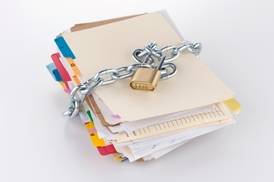
For many psychiatry patients, keeping one's files and records of their psychiatric diagnoses is of the utmost importance, primarily because of the continued stigma many of these patients experience at their workplace and in their own communities. Some individuals also avoid seeking medical attention for their mental health concerns out of fear of such incredibly personal and sensitive information being documented and then becoming available to others. Back in November for example, a Canadian woman was denied entry into the United States because of her history of depression, raising concern over how such private health information had become available to the US border agents.
However, could keeping patients' psych records on lockdown be more detrimental than protective? Are there any benefits to sharing such health information with other healthcare providers? In the Time article, "How Keeping Psych Records Too Private Can Hurt Patient Care" by Maia Szalavitz, the other side of this ongoing debate is investigated. Through persuasive arguments, the article goes on to suggest that allowing psych records to be accessible by other healthcare professionals caring for a patient with a mental illness may actually be beneficial, improve patient care, and help to make the healthcare system more efficient.
Also commonly debated is patients' access to their own psych records. While patients have the right to request access to their medical records should they so choose, there are now some hospitals and physician groups that have been posting notes from patient visits on secure online systems for their patients to access and read. In the Boston Globe article, "Doctors' Notes on Mental Health Shared with Patients" by Liz Kowalczyk, mental health providers from the Beth Israel Deaconess Medical Centre explain how they have begun posting mental health notes online for patients' viewing pleasure. While many worry of patients misinterpreting the notes or becoming confused or upset by them, there are plenty of benefits with making such information and healthcare more transparent. As the article explains, "sharing the notes could improve care by encouraging patients to more actively participate in their treatment, while inspiring providers to describe patients nonjudgmentally. Patients can correct mistakes, such as a wrong medication dose. And rather than write a word such as “paranoid,'’ which to many people “means crazy or bad,’’ Kahn said he now uses less-loaded terms such as “persecutory anxiety"" (The Boston Globe).
Important articles for any medical professional to read and consider!
 RSS Feed
RSS Feed
